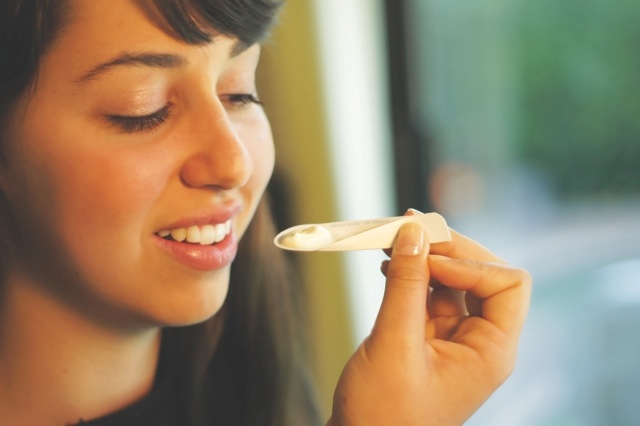
WholeFoods Magazine
Ending Take Out Waste

Several months ago, I read about a Swami who prohibited his followers from using plastic bags. I was mortified when I realized I was eating organic food daily with a plastic fork and knife.
According to the Clean Air Council, enough paper and plastic utensils are thrown away every year to circle the equator 300 times. It is estimated that close to 40 billion individual plastic utensils—meaning 14 and 18 billion plastic spoons—are produced each year, and with such low rates of reuse and recycling, most of them end up in our landfills, beaches and oceans. They are likely to remain there for hundreds of thousands of years. This astounding figure gives businesses an easy opportunity to show their customers they authentically care about the environment by doing away with these unnecessary pollutants and replacing them with environmentally friendly utensils.
It is believed that there are two large bodies of trash possibly the size of the state of Texas, consisting to a large extent of plastic flotsam, bobbing along in the middle of the Pacific Ocean. Among the items most often found in the sea and in landfills round the world are plastic eating utensils. The discarded spoons, knives and forks are in the hundreds of millions if not billions. There is good reason for this. Every time a customer buys most takeout foods, or gets an in-store sample of yogurt or soft ice cream, plastic utensils are provided. Spoons used to taste products in supermarkets are immediately discarded. They are dispensed to customers freely at restaurants, fast food stands, food carts and are stacked in bins at the condiment counter. Take all you want. Used only once, plastic spoons are often employed to measure teaspoons of sugar and then stirred one’s tea or coffee and are immediately tossed into the trash.
Although many businesses in the retail and restaurant sector have already adopted environmentally positive operations, there is still one section that needs major improvement: companies that provide plastic utensils.
Customer approval of green business practices and eco-friendly products have clearly been on the rise in recent years. According to a 2009 survey conducted by IPSOS, one of the world’s largest research companies, 79% of consumers would rather buy from companies doing their best to reduce their impact on the environment. With a staggering percentage like this, it is evident that a large and rising number of consumers judge a business based on how green they feel it is.
 Founder and Creative Director, Peggy Cross, created an environmental solution: EcoTensil, a paperboard tasting spoon that is slick like a milk carton with a water-based coating, but 100% recyclable, biodegradable and sustainable. It can be used for trying frozen yogurt, pudding, soft serve ice creams, and similar items. Besides obvious environmental benefits, its size and design allows for a more satisfying bite and a more comfortable grip.
Founder and Creative Director, Peggy Cross, created an environmental solution: EcoTensil, a paperboard tasting spoon that is slick like a milk carton with a water-based coating, but 100% recyclable, biodegradable and sustainable. It can be used for trying frozen yogurt, pudding, soft serve ice creams, and similar items. Besides obvious environmental benefits, its size and design allows for a more satisfying bite and a more comfortable grip.
Such eco-friendly companies are reaching health-conscious consumers not only concerned about what they’re eating, but also about what they’re eating it with. One of EcoTensil's initial partners is the popular yogurt company, Stonyfield. Stonyfield is addressing the consumer outcry for greener business practices by serving up the EcoTaster (a small tasting spoon from EcoTensil) with their sample products at events like the U.S. Open. The EcoTaster is made from renewable SFI certified sources, and is 100% recyclable, biodegradable and uses less material overall.
Consumers are buying reusable utensils and food containers for dining on the go (like To-Go Ware) and renewable kitchen products (such as from Bambu Home) for at-home use. Retailers that are successfully selling those types of products should be catering to consumers with environmental take out and tasters, as well.
 Nancy Trent is a writer and speaker, a lifelong health nut, a globe-trotting trend watcher and the founder and president of Trent & Company, a New York-based marketing communications firm. Trent & Company grew out of Nancy’s personal commitment to helping people live longer and healthier lives. A former journalist for New York magazine, Nancy has written seven books on healthy lifestyles, serves on the editorial boards of several magazines and travels around the world speaking at conferences and trade shows on trends in the marketplace. She is a recognized expert in PR with more than 20 years of experience creating and managing highly successful campaigns. Nancy can be reached at (212) 966-0024 or through e-mail at nancy@trentandcompany.com. You may also visit www.trentandcompany.com.
Nancy Trent is a writer and speaker, a lifelong health nut, a globe-trotting trend watcher and the founder and president of Trent & Company, a New York-based marketing communications firm. Trent & Company grew out of Nancy’s personal commitment to helping people live longer and healthier lives. A former journalist for New York magazine, Nancy has written seven books on healthy lifestyles, serves on the editorial boards of several magazines and travels around the world speaking at conferences and trade shows on trends in the marketplace. She is a recognized expert in PR with more than 20 years of experience creating and managing highly successful campaigns. Nancy can be reached at (212) 966-0024 or through e-mail at nancy@trentandcompany.com. You may also visit www.trentandcompany.com.
Published in WholeFoods Magazine, January 24, 2011
Several months ago, I read about a Swami who prohibited his followers from using plastic bags. I was mortified when I realized I was eating organic food daily with a plastic fork and knife.
According to the Clean Air Council, enough paper and plastic utensils are thrown away every year to circle the equator 300 times. It is estimated that close to 40 billion individual plastic utensils—meaning 14 and 18 billion plastic spoons—are produced each year, and with such low rates of reuse and recycling, most of them end up in our landfills, beaches and oceans. They are likely to remain there for hundreds of thousands of years. This astounding figure gives businesses an easy opportunity to show their customers they authentically care about the environment by doing away with these unnecessary pollutants and replacing them with environmentally friendly utensils.
It is believed that there are two large bodies of trash possibly the size of the state of Texas, consisting to a large extent of plastic flotsam, bobbing along in the middle of the Pacific Ocean. Among the items most often found in the sea and in landfills round the world are plastic eating utensils. The discarded spoons, knives and forks are in the hundreds of millions if not billions. There is good reason for this. Every time a customer buys most takeout foods, or gets an in-store sample of yogurt or soft ice cream, plastic utensils are provided. Spoons used to taste products in supermarkets are immediately discarded. They are dispensed to customers freely at restaurants, fast food stands, food carts and are stacked in bins at the condiment counter. Take all you want. Used only once, plastic spoons are often employed to measure teaspoons of sugar and then stirred one’s tea or coffee and are immediately tossed into the trash.
Although many businesses in the retail and restaurant sector have already adopted environmentally positive operations, there is still one section that needs major improvement: companies that provide plastic utensils.
Customer approval of green business practices and eco-friendly products have clearly been on the rise in recent years. According to a 2009 survey conducted by IPSOS, one of the world’s largest research companies, 79% of consumers would rather buy from companies doing their best to reduce their impact on the environment. With a staggering percentage like this, it is evident that a large and rising number of consumers judge a business based on how green they feel it is.
 Founder and Creative Director, Peggy Cross, created an environmental solution: EcoTensil, a paperboard tasting spoon that is slick like a milk carton with a water-based coating, but 100% recyclable, biodegradable and sustainable. It can be used for trying frozen yogurt, pudding, soft serve ice creams, and similar items. Besides obvious environmental benefits, its size and design allows for a more satisfying bite and a more comfortable grip.
Founder and Creative Director, Peggy Cross, created an environmental solution: EcoTensil, a paperboard tasting spoon that is slick like a milk carton with a water-based coating, but 100% recyclable, biodegradable and sustainable. It can be used for trying frozen yogurt, pudding, soft serve ice creams, and similar items. Besides obvious environmental benefits, its size and design allows for a more satisfying bite and a more comfortable grip.
Such eco-friendly companies are reaching health-conscious consumers not only concerned about what they’re eating, but also about what they’re eating it with. One of EcoTensil's initial partners is the popular yogurt company, Stonyfield. Stonyfield is addressing the consumer outcry for greener business practices by serving up the EcoTaster (a small tasting spoon from EcoTensil) with their sample products at events like the U.S. Open. The EcoTaster is made from renewable SFI certified sources, and is 100% recyclable, biodegradable and uses less material overall.
Consumers are buying reusable utensils and food containers for dining on the go (like To-Go Ware) and renewable kitchen products (such as from Bambu Home) for at-home use. Retailers that are successfully selling those types of products should be catering to consumers with environmental take out and tasters, as well.
 Nancy Trent is a writer and speaker, a lifelong health nut, a globe-trotting trend watcher and the founder and president of Trent & Company, a New York-based marketing communications firm. Trent & Company grew out of Nancy’s personal commitment to helping people live longer and healthier lives. A former journalist for New York magazine, Nancy has written seven books on healthy lifestyles, serves on the editorial boards of several magazines and travels around the world speaking at conferences and trade shows on trends in the marketplace. She is a recognized expert in PR with more than 20 years of experience creating and managing highly successful campaigns. Nancy can be reached at (212) 966-0024 or through e-mail at nancy@trentandcompany.com. You may also visit www.trentandcompany.com.
Nancy Trent is a writer and speaker, a lifelong health nut, a globe-trotting trend watcher and the founder and president of Trent & Company, a New York-based marketing communications firm. Trent & Company grew out of Nancy’s personal commitment to helping people live longer and healthier lives. A former journalist for New York magazine, Nancy has written seven books on healthy lifestyles, serves on the editorial boards of several magazines and travels around the world speaking at conferences and trade shows on trends in the marketplace. She is a recognized expert in PR with more than 20 years of experience creating and managing highly successful campaigns. Nancy can be reached at (212) 966-0024 or through e-mail at nancy@trentandcompany.com. You may also visit www.trentandcompany.com.
Published in WholeFoods Magazine, January 24, 2011








